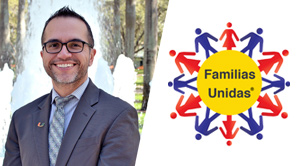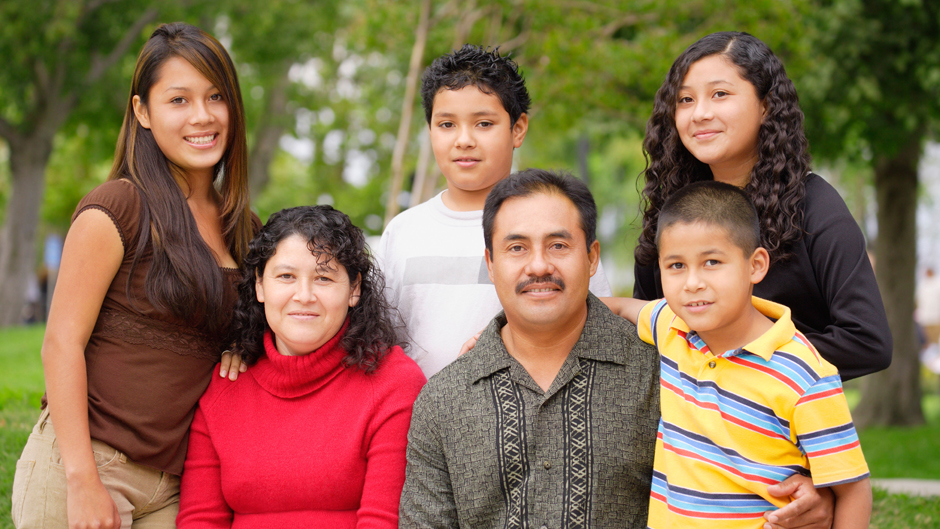The National Institutes of Health (NIH) has awarded Guillermo “Willy” Prado, PhD, professor of Nursing and Health Studies, Public Health Sciences, and Psychology at the University of Miami, and his research team a four-year, $3.05 million grant for new research, “Scaling a Parenting EBI (Evidence-Based Intervention) for Latinx Youth Mental Health in Primary Care.”
 For the past 20 years, Dr. Prado and his team have been developing and deploying Familias Unidas, a parenting intervention shown to reduce depressive and anxious symptoms as well as suicide behavior in Hispanic youth. This new study will allow the Miami-based researchers to assess the recently enhanced online adaptation of Familias Unidas in real-world clinical settings with an eye toward sustainability.
For the past 20 years, Dr. Prado and his team have been developing and deploying Familias Unidas, a parenting intervention shown to reduce depressive and anxious symptoms as well as suicide behavior in Hispanic youth. This new study will allow the Miami-based researchers to assess the recently enhanced online adaptation of Familias Unidas in real-world clinical settings with an eye toward sustainability.
The NIH’s National Institute of Mental Health approved the research team’s proposal for an effectiveness-implementation hybrid trial (type I) of the eHealth Familias Unidas for Mental Health intervention; the randomized rollout design includes 18 clinics. Dr. Prado is a Principal Investigator (PI) with Dr. C. Hendricks Brown, of Northwestern University.
Their trial has three stated aims: First, evaluate the effectiveness of eHealth Familias Unidas for Mental Health in preventing/reducing depressive and anxiety symptoms, suicide ideation and behavior, and drug misuse among adolescent participants screened for poor family communication, elevated levels of depressive or anxiety symptoms, or a history of suicide ideation or attempts. Second, determine whether eHealth Familias Unidas’ impact on the outcomes is explained by family communication and externalizing behaviors, including drug misuse, and whether the impact on the outcomes vary by parental depression. Finally, collect data on how the intervention’s impact on mental health and drug misuse, along with each clinic’s continued use of the intervention, is affected by the varying quality of implementation at the clinic and clinician levels.
This research is necessary because individuals younger than 18 who experience mental health disorders have poorer educational, social, employment, and health outcomes compared to those without mental health or substance use disorders. Significantly, an estimated 50 percent of all mental health conditions begin by age 14, with the majority of cases persisting undetected and untreated. Moreover, not only are Hispanic youth in particular one of the largest and fastest-growing youth populations in the U.S., Hispanic youth also have higher rates of depressive and anxiety symptoms, drug use, and suicide ideation and attempts than their non-Hispanic white peers.
“Interventions designed to interrupt the effects of mental health disorders and other poor outcomes are imperative for maximizing health among Hispanic youth,” says Dr. Prado, co-developer of Familias Unidas. “Until now, evidence-based preventive interventions such as Familias Unidas and our online adaptation, eHealth Familias Unidas, have largely been tested in schools and delivered by research staff. Evaluating these interventions in real-world studies of primary care delivered by clinic staff, and understanding the implementation processes that help or hinder their integration in systems, is key to improving mental health and reducing disparities in the U.S.”
Parents participating in the 12-week primary care trial online will learn effective strategies for communicating with their teens, such as positive reinforcement, behavioral management, and protection from peer pressure around illicit substances. Youth will develop their interpersonal and social protective factors to address their internalizing and suicide symptoms, including family and peer relations and skills. Parents and youth will also receive psychoeducational information regarding youth mental health symptoms, its risks and consequences. Familias Unidas researchers will assess both parents and youth at the time of the intervention, and at 3, 6, and 18 months post-intervention.
“The National Academy of Medicine has indicated that rigorous evidence is necessary for the U.S. Preventive Services Task Force to make recommendations on integrating family-based prevention programs into primary care,” says Dr. Prado, who also serves as vice provost for faculty affairs and dean of the Graduate School at UM. “This study contributes to this much-needed evidence and consequently has the potential to transform the way prevention programs are delivered in primary care.”
For more information about Familias Unidas, call 305-243-2341. Research reported was supported by the National Institute of Mental Health of the National Institutes of Health under Award Number R01MH124718. The content is solely the responsibility of the authors and does not necessarily represent the official views of the National Institutes of Health.

